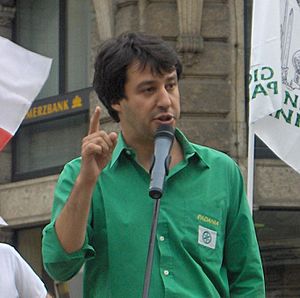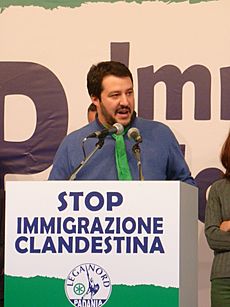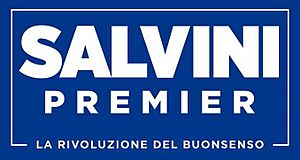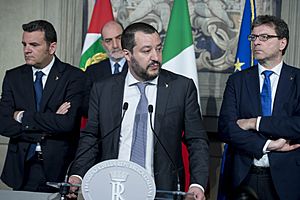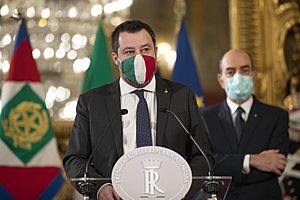Matteo Salvini facts for kids
Quick facts for kids
Matteo Salvini
|
|
|---|---|
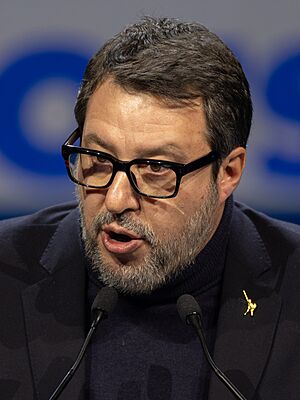
Salvini in 2025
|
|
| Deputy Prime Minister of Italy | |
| Assumed office 22 October 2022 Serving with Antonio Tajani
|
|
| Prime Minister | Giorgia Meloni |
| Preceded by | Himself and Luigi Di Maio (2019) |
| In office 1 June 2018 – 5 September 2019 Serving with Luigi Di Maio
|
|
| Prime Minister | Giuseppe Conte |
| Preceded by | Angelino Alfano (2014) |
| Succeeded by | Antonio Tajani and himself (2022) |
| Minister of Infrastructure and Transport | |
| Assumed office 22 October 2022 |
|
| Prime Minister | Giorgia Meloni |
| Preceded by | Enrico Giovannini |
| Minister of the Interior | |
| In office 1 June 2018 – 5 September 2019 |
|
| Prime Minister | Giuseppe Conte |
| Preceded by | Marco Minniti |
| Succeeded by | Luciana Lamorgese |
| Federal Secretary of the League | |
| Assumed office 15 December 2013 |
|
| Preceded by | Roberto Maroni |
| Member of the Senate of the Republic | |
| Assumed office 23 March 2018 |
|
| Constituency | Lazio (2018–2019) Calabria (2019–present) |
| Member of the European Parliament | |
| In office 14 July 2009 – 22 March 2018 |
|
| Constituency | North-West Italy |
| In office 20 July 2004 – 7 November 2006 |
|
| Constituency | North-West Italy |
| Member of the Chamber of Deputies | |
| In office 6 March 2013 – 15 March 2013 |
|
| Constituency | Lombardy 1 |
| In office 29 April 2008 – 13 July 2009 |
|
| Constituency | Lombardy 1 |
| Personal details | |
| Born | 9 March 1973 Milan, Italy |
| Political party | Lega |
| Other political affiliations |
Lega Nord Us with Salvini (2014–2017) |
| Spouse |
Fabrizia Ieluzzi
(m. 2001; div. 2010) |
| Domestic partners | Giulia Martinelli (2011–2014) Elisa Isoardi (2015–2018) Francesca Verdini (2019–present) |
| Children | 2 |
| Signature |  |
Matteo Salvini (born 9 March 1973) is an Italian politician. Since 2022, he has served as the Deputy Prime Minister of Italy and the Minister of Infrastructure and Transport. He has been the leader of Italy's Lega party since 2013 and a senator since 2018.
Salvini is known for being a Eurosceptic, which means he is critical of the European Union (EU). He has especially criticized the euro, the currency used by many EU countries. He is also known for his strong views against illegal immigration. Many people see him as a leading figure in the populist movement in Europe. Populist leaders often claim to represent the wishes of ordinary people against a ruling elite.
Salvini has been a very influential figure in Italian politics. After the 2018 election, many newspapers called him one of the most powerful politicians in Italy. He condemned the 2022 Russian invasion of Ukraine. In the past, he had praised Russia's president Vladimir Putin.
Contents
Early Life and Career
Matteo Salvini was born in Milan, Italy, in 1973. His father was a business executive and his mother was a homemaker. As a kid, he appeared on TV game shows. In 1985, he was on Doppio slalom, and in 1993, he was on Il pranzo è servito.
He studied at the University of Milan but left to focus on his political career and never graduated.
In 1990, Salvini joined the Lega Nord (Northern League), a political party that wanted more independence for the northern regions of Italy. He became active in the party's youth group. In 1993, he was elected to the City Council of Milan, where he served for almost 20 years. He also worked as a journalist for the party's newspaper and radio station.
Political Career
Member of the European Parliament
In 2004, Salvini was elected as a Member of the European Parliament (MEP), representing the North-West region of Italy. The European Parliament is a group of politicians from all EU countries who help make laws for Europe. He served as an MEP from 2004 to 2006 and was elected again in 2009, serving until 2018.
During his time in the European Parliament, he was part of several committees. These included the Committee on Culture and Education and the Committee on the Internal Market and Consumer Protection.
In 2012, Salvini became the leader of the Lombard League, the section of his party in the Lombardy region. He was also elected to the Chamber of Deputies, one of Italy's two houses of parliament, in 2013 but gave up his seat to remain an MEP.
Leader of the Lega Nord
In December 2013, Salvini was elected as the Federal Secretary, or main leader, of the Lega Nord party. He won with 82% of the vote.
Under his leadership, the party's focus began to change. Instead of just focusing on northern Italy, Salvini wanted the party to appeal to the whole country. He also became very critical of the European Union and the euro. He worked with other Eurosceptic leaders in Europe, like Marine Le Pen from France and Geert Wilders from the Netherlands.
For the 2014 European Parliament election, the party's logo was changed to say Basta Euro ("No more Euro") to show its anti-euro stance. The party's popularity grew, and it started to perform well in elections outside of its traditional northern strongholds.
2018 General Election
For the 2018 general election, Salvini's party ran under the name "Lega" (League), dropping the word "Nord" (North). This showed its new national focus. The party had a very successful election, winning over 17% of the vote and becoming the largest party in the centre-right coalition.
However, no single party or coalition won enough seats to govern alone. This led to a period of negotiation to form a government. After weeks of talks, the Lega and the Five Star Movement (M5S), another populist party, agreed to form a coalition government. They chose Giuseppe Conte, a law professor, to be the Prime Minister.
Government Roles
First Term as Deputy Prime Minister (2018–2019)
On 1 June 2018, Salvini became Deputy Prime Minister and Minister of the Interior. As Interior Minister, he was in charge of public security and immigration. He quickly took action to reduce the number of migrants arriving in Italy by sea.
He announced the closure of Italian ports to ships operated by non-governmental organizations (NGOs) that rescued migrants in the Mediterranean Sea. This led to several standoffs, where ships with hundreds of migrants were left at sea for days until other European countries agreed to take them in.
In September 2018, his "Salvini Decree" was approved. This new law made it harder for migrants to get protection and easier for the government to deport them.
In August 2019, Salvini tried to end the coalition with the Five Star Movement, hoping to trigger a new election. However, his plan failed. Prime Minister Conte resigned but then formed a new government with the centre-left Democratic Party, leaving Salvini and the Lega in the opposition.
Return to Government (2022–present)
After being in the opposition and then supporting a national unity government under Mario Draghi, Salvini's Lega party joined a new coalition after the 2022 election.
On 22 October 2022, Giorgia Meloni of the Brothers of Italy party became Prime Minister. Salvini returned to his role as Deputy Prime Minister and was also appointed Minister of Infrastructure and Transport.
Political Views
Salvini is known for his strong political opinions. He is a hard Eurosceptic, meaning he is very critical of the European Union. He has called the euro currency a "crime against humanity." He also strongly opposes illegal immigration.
On economic issues, he supports a flat tax system, where everyone pays the same tax rate. He also supports protectionism, which means protecting a country's own businesses from foreign competition.
On social issues, Salvini opposes same-sex marriage and civil unions. He supports looser gun laws.
In foreign policy, Salvini has been critical of Turkey joining the EU. He supported the international sanctions against Russia being lifted and has praised leaders like Donald Trump and Jair Bolsonaro. He has also been a strong supporter of Israel.
Personal Life
Matteo Salvini was married to Fabrizia Ieluzzi, a journalist, from 2001 to 2010. They have one son. He also has a daughter from a later relationship. He is currently engaged to Francesca Verdini.
His supporters often call him "The Captain" (Il Capitano). He is a Roman Catholic and a big fan of the AC Milan football club.
Electoral History
| Election | House | Constituency | Party | Votes | Result | |
|---|---|---|---|---|---|---|
| 2004 | European Parliament | North-West Italy | LN | 14,707 | ||
| 2008 | Chamber of Deputies | Lombardy 1 | LN | – | ||
| 2009 | European Parliament | North-West Italy | LN | 69,989 | ||
| 2013 | Senate of the Republic | Lombardy 1 | LN | – | ||
| 2014 | European Parliament | North-West Italy | LN | 223,410 | ||
| 2018 | Senate of the Republic | Lazio | Lega | – | ||
| 2022 | Senate of the Republic | Apulia | Lega | – | ||
See also
 In Spanish: Matteo Salvini para niños
In Spanish: Matteo Salvini para niños
- Sardines movement
Images for kids
 | Selma Burke |
 | Pauline Powell Burns |
 | Frederick J. Brown |
 | Robert Blackburn |


